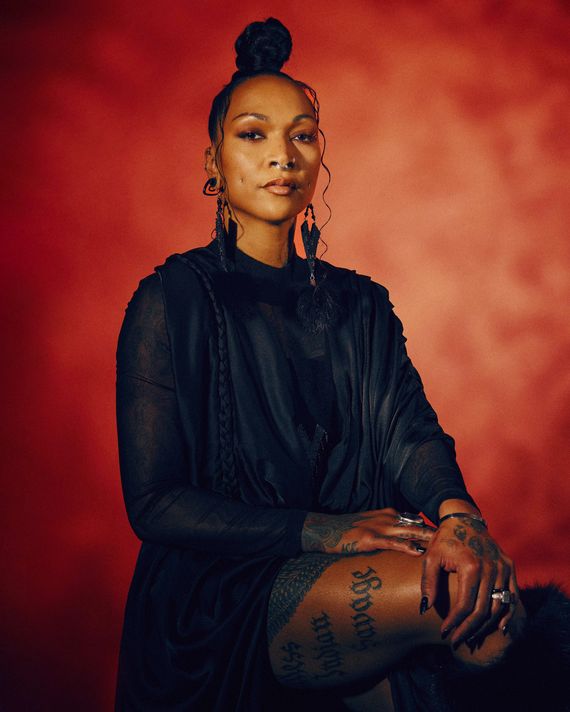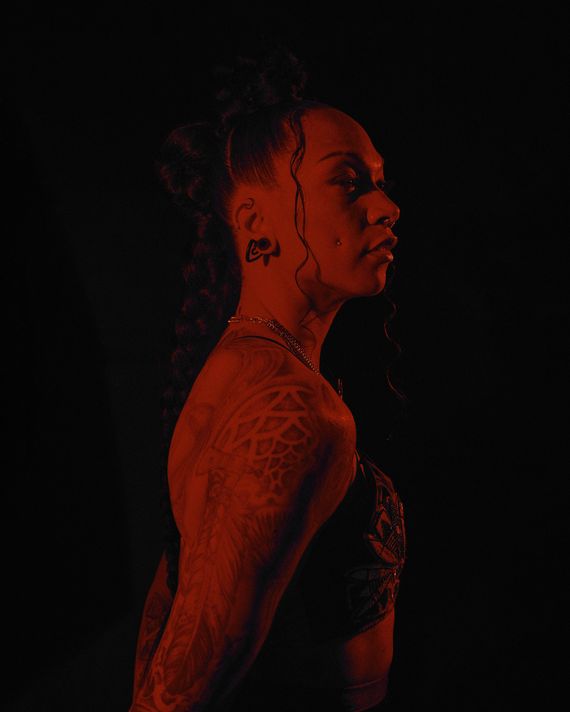
This interview was published on February 5, 2024. True Detective: Night Country has since received 19 nominations for the 2024 Emmy Awards, including an Outstanding Supporting Actress nod for Kali Reis. Read all of Vulture’s Emmy-race coverage here.
Twelve years ago, while augmenting her boxing career with nightclub security work in her hometown of Providence, Rhode Island, Kali Reis says she was assaulted by a police officer. Her 2015 federal lawsuit against the city accused the officer of punching, pepper-spraying, and handcuffing her when she tried to give an unconscious co-worker first aid after a fight at the club. In 2017, the City Council Claims Committee settled with Reis, and the officer left the force. In her typically self-deprecating way, Reis calls the experience “funny,” then catches herself and reverses stance on the grim piece of personal history. When she speaks about how that man “had me convinced that I did something wrong,” about how it was another moment in her life when she felt the constrictions of being “the only female in the room, the only woman in a man’s world,” about the yearslong legal battle to ensure “he doesn’t do this to anybody else,” Reis recounts a drawn-out, thoroughly unfunny experience. “It’s one of those things that comes full circle,” she says. In taking on Trooper Evangeline Navarro, the character she plays on True Detective: Night Country, Reis saw a chance to find power in an occupation that previously harmed her. “Sometimes I laugh and wonder if he’s gonna watch the show and be like, Wait a minute.”
Reis is used to “Wait a minute” reactions. A boxing champion in two different weight classes and one of the first women to fight on an HBO card, she’s covered in tattoos inspired by her Seaconke Wampanoag and Cape Verdean ancestry. (The sleeve tattooed by her cousin, TyEsha Reels, includes Reis’s Native name, “Mequinonoag,” meaning “many feathers” or “many talents,” while the “merciless Indian savage” text on her thigh is pulled from the Declaration of Independence.) Reis’s symmetrical dimple piercings only get deeper when she smirks or laughs, which she does often when we discuss her work on Night Country — sparring with co-star Jodie Foster, “a mentor, a friend”; building Navarro’s backstory with input from her husband, Brian Cohen, her boxing trainer and manager; sharing scenes with other Indigenous actresses. Director and co-writer Issa López sought out Reis after seeing her performance in the 2021 indie thriller Catch the Fair One, which Reis co-wrote with director Josef Kubota Wladyka. She plays a Native boxer who goes undercover in a sex-trafficking ring to find her missing younger sister, a role that incorporated Reis’s own practice of bringing Native dancers and musicians into her boxing-ring walks. Night Country — with its out-of-the-ring action sequences, knotty dialogue, and sex scenes — pushes Reis into a realm of fiction that comes with its own vulnerabilities.
Reis and I are seated by the radiator at Lavaux Wine Bar in New York, trying to get warm on a windy, single-digit-temperature day that hearkens back to the seven months she spent in Iceland shooting Night Country. She’s wearing a black overcoat decorated with a capital K that is typical of her Goth-inflected press-tour fashion to this point. (A fan of ’90s-kid culture like Linkin Park, Tim Burton, The Matrix, and The Crow, she jokes that Eric Draven’s look inspired stylist Kayla Lookinghorse’s choices.) We’re sipping wine and dipping chunks of bread into a pot of pleasantly funky truffle fondue; Reis tried the fungi for the first time in Iceland after seeing the film Pig, and now “I’m down for truff.” When she gets excited, as she is about the opportunity to eat after a day full of interviews, her New England accent becomes more pronounced. It’s such a part of her that López changed Navarro’s backstory to include time spent in Boston.
Originally written as a “hardass” military veteran, Navarro took on smoother contours as Reis prepared for the role. She journaled as the character until she found the “vulnerable mush” needed for scenes with Navarro’s mentally ill sister Julia (Aka Niviâna) and the Iñupiaq and Inuit women of Ennis, whom Navarro is devoted to protecting despite being unsure of their acceptance of her. Reis identifies as two-spirit, which she describes as less an expression of sexuality (like Navarro, she’s been in relationships with both women and men) and more about feeling “completely comfortable being my feminine and completely comfortable being my masculine.” That fluidity allowed her to move between Navarro’s contrasts, her softness and her swagger. Her boxing experience informed how the character gauged distance and effort for throwing punches with unruly Alaskan barflies, but Reis needed a day-to-day discipline to separate herself from Navarro. Before going to set every day, she took out her septum piercing and her gauges and said to herself, “Kali’s taking a seat,” as she left her trailer. “It really helped me to dive all the way in — excuse the vulgar language — balls deep, dude,” Reis says.
Before filming, Reis consulted with the series’ producers, whom she calls “my sisters,” Cathy Tagnak Rexford (who has Iñupiaq ancestry) and Princess Daazhraii Johnson (who is Neets’aii Gwich’in) on the knowledge of Native customs that would help shape Navarro. In one pivotal scene from “Part 3,” we see Navarro in flashback, relatively new to the Alaska Police Force (APF) and barging into a building to arrest an activist for destroying local mine property. She recites the charges against Annie (Nivi Pedersen) tonelessly at first; Navarro is all procedure, fresh out of the military. But as she moves deeper into the building, expecting to find a command outpost of anti-mining resistance, Navarro instead encounters a sparsely resourced birthing center where Annie and four other doulas are guiding a woman through a traditional water birth. Reis’s Navarro is aware she’s entering an intimate space where she’s initially unwanted. (Her eyes go wide at the scene in front of her, and she flinches when the woman in labor calls her “that bitch.”) But when Navarro is invited to participate, Reis moves like she’s yearning for acceptance. She rushes to fill a pot with hot water, she leans down among the women when one of the doulas takes her hand, she removes her hat to show her respect, and she sings and chants alongside them. When the baby is born, Navarro offers a long blink and a tentative smile as gestures of relief.
“I liked that I didn’t know what to expect because that’s exactly what Navarro walks into,” Reis says, her lack of familiarity with Native birthing practices lending authenticity to the scene. “I’ve always known, as an Indigenous woman and a woman of color, that we have to protect our women. We have to protect ourselves.” Reis has advocated for years for missing and murdered Indigenous women and worked with Native girls in group homes “for as long as I can remember,” maintaining close relationships with four young women she helped care for. About a decade ago, while working on PR for her boxing career with her friend Chenae Bullock of the Shinnecock Nation, Reis settled on the catchphrase “Fight for all nations,” a reflection of her interest in “not just punching people in the face” but “doing things for our people.”
In Night Country, that fierce compassion drives Navarro’s relationship with her closest living family member, Julia. Reis and Niviâna, an Inuk climate activist and first-time actress from Greenland whom Reis calls “my little sister for real,” bonded through an exercise assigned by acting coach Leigh Kilton-Smith early in production. In Reis’s trailer, she and Niviâna held each other’s hands and stared into each other’s eyes without speaking for 23 minutes. “There was so much emotion, so much trust, so much care, so much vulnerability, without saying a word,” Reis says. “I could tell what story she was telling; she could tell what story I was telling.” The Native actresses, whom Reis affectionately calls “the aunties,” socialized so loudly and exuberantly on set (“All you could hear was cackling”) that Reis says Lopez had to ask them to be quiet. “We did talk about it, like, ‘Dude, Natives taking over!’ We’re here — we’ve been here — doing this. Storytelling is in our blood, and that’s how we passed down tradition, culture, language. Everything is telling stories.” Before leaving Iceland, Reis got the series’ defining spiral tattooed on her leg in the Iñupiaq stick-and-poke style by Varna Marianne Nielsen, a drummer and singer who played one of the doulas.
When it came time to face off with Foster, who plays Navarro’s former partner and sort-of mother figure Liz Danvers, Reis would “fangirl like a motherfucker” only briefly — then get to work. She remembers Foster saying to her, “‘You have this way of looking at people in their eyes in scenes, and you like, suck their soul.’ I’m like, ‘I don’t mean to.’ It’s just the intensity I have, the focus.” Where Danvers has compartmentalized her personal tragedies and approaches life with gruff, almost nihilistic pragmatism, Navarro is a raw nerve, an empath desperate to find the truth about the bewildering deaths they’re investigating. The two are constantly butting heads about the role of the police, the existence of God, and whether Ennis’s Native community should further assimilate. In customary True Detective fashion, these conversations usually take place in the car. In those scenes, Navarro challenges Danvers like no one else — and holds her own.
Those months in Iceland, during which Reis worked in literally freezing conditions and went toe to toe with an Oscar winner, broadened her understanding of herself and her capabilities, she says. Such challenges might have seemed insurmountable for another actor; for Reis, it was just another grueling training period with a victory she could claim on the other side. “Reality set in when we were sitting in the makeup trailer one day. Jodie’s like, ‘Dude, this is the hardest and the longest job I’ve ever had.’ I’m like, ‘What? This is not your normal?’” But Reis is used to advancing forward, to trading blows and taking it on the chin — to doing whatever it takes to perform at her peak.
Though Reis hasn’t hung up her gloves yet — she has a “heavy hand” in training the other female fighters her husband manages — acting is her primary focus for now. She had only a six-day break between completing Night Country and flying to Calgary for her role in the upcoming Wind River sequel, The Next Chapter, and she wrapped an indie film tentatively titled The Rebuilding Project in August. She’s ready for more, for roles that push her dramatic abilities or introduce viewers to her improv skills (“I want to do a comedy, yo!”), for characters that focus on her heritage without making her the “token Native” or have nothing to do with it at all. To quote the series she calls an extension of “my medicine,” Reis knows who she is, and there’s a victory in that. “It’s taking it and going, All right, I’ll be your merciless Indian savage,” Reis says of her Founding Fathers–quoting tattoo. “Be careful what you label me.”
More From This Series
- Vulture’s 25 Most-Read TV Recaps of 2024
- The Best TV Shows of 2024
- How Did Best Song Become the Year’s Most Exciting Emmys Race?



